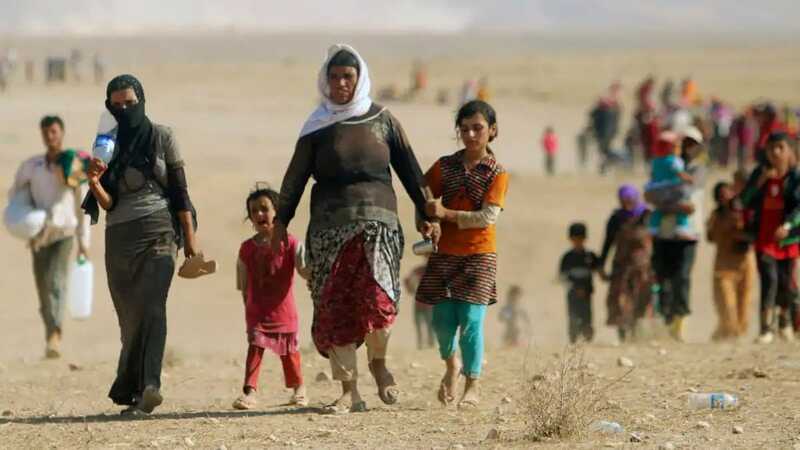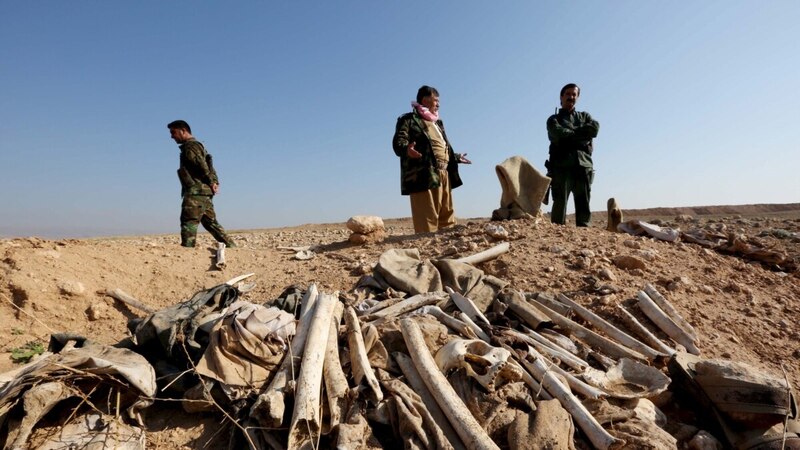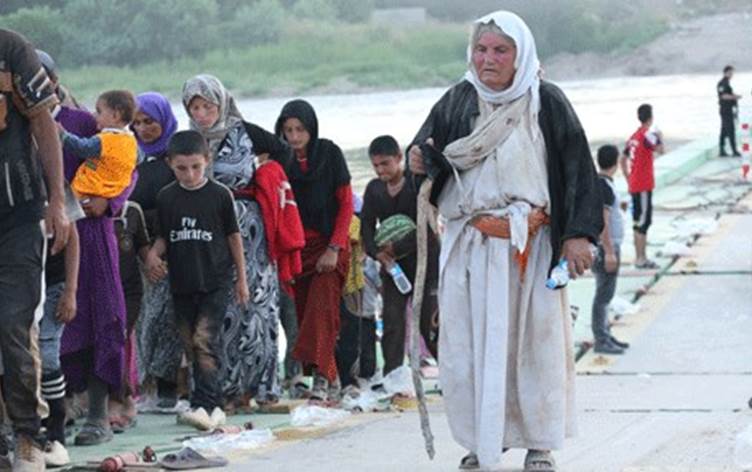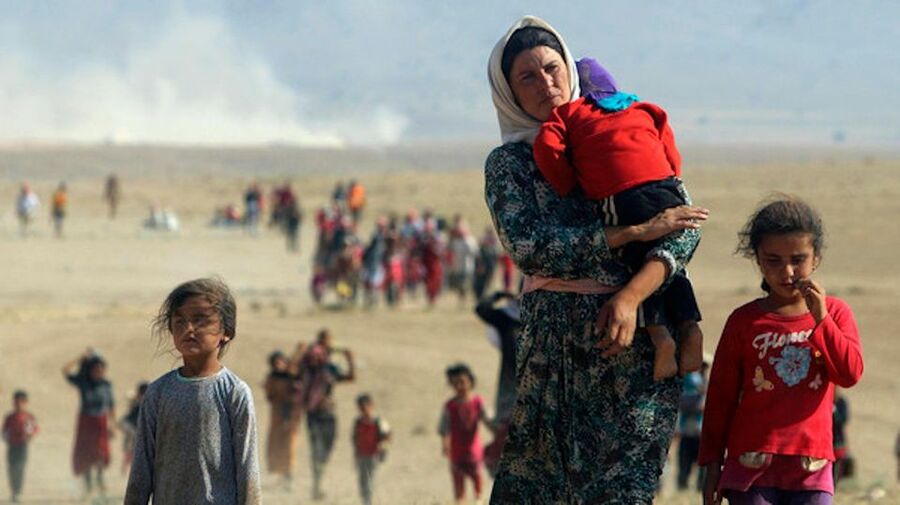Yazidi Kurds
Throughout history, the Yazidis have lived in Kurdistan among the north, west, and south borders. In the book Sharafnama by Sharaf Khan Badlisi (1599), it is mentioned that the Yazidis live in the areas of Mosul, Duhok, Amed, Aleppo, and Botan.
The Yazidis speak Kurdish and the Kurmanji dialect, while those around Mosul, Syria, and Bashiqa speak Arabic. All their religious practices are in Kurdish, but their religious books are written in Syriac. The religion is based at the Lalish temple near Mosul, and its most prominent tribes are Hababat, Masqura, Amra, Abidi, Haraqi, Shahwan, Hayali, and Jahsh.
In addition to Kurdistan, Iraq, and Syria, the Yazidis exist in Armenia and Georgia.
Throughout history, the Yazidis have been faced with attacks and genocide 72 times, which has led to the dispersion of the Yazidis in other countries and many of them in different regions, making them a closed community, united among themselves and always living together. In the latest attack on the Yazidis, in 2014, they were attacked by the terrorist group ISIS, killing hundreds of people and displacing thousands from Shengal, and many of their girls were sold as slaves in the markets of Mosul and Syria.

Genocide of the Yazidis by ISIS
On August 3, 2014, the terrorist group ISIS attacked Shengal (Sinjar), massacred Yazidi Kurds and arrested thousands of people. As of August 3, 2023, 2713 Yazidi Kurds are missing, including 1270 women and 1443 men.
During the brutal attack of ISIS, the only place the Yazidis ran was Mount Shengal; Those who ran away from the war fled to Mount Shengal; They then moved to West Kurdistan, and then most of them returned through the Semelka-Peshawar gate and were displaced from the cities of the Kurdistan Region and some of them went abroad.
So far, 3570 people have been rescued, including 339 men, and 1214 women, and the rest are girls and boys.
After the capture of Shengal by ISIS, the terrorist criminal group began to kill and bury many civilians in the region. According to all international standards, this crime against humanity falls within the crime of genocide.
The brutal attacks of ISIS on the Yazidi Kurds attracted some attention from the international community and led to US intervention in Iraq, which began with US air strikes against ISIS. In addition, the United States, Britain, and Australia sent a plane to the Yazidis who had fled to Mount Sinjar.
On August 15, 2018, the first international conference on the genocide of the Yazidi Kurds was held in Erbil. Khairi Bozani, Director General of Yazidi Affairs and in charge of the rescue of Yazidi hostages, said that ISIS has arrested more than 6000 Yazidi Kurds and more than 100000 Yazidi Kurds have migrated abroad.
He continued, “What brings us together today is to talk about another massacre against a peaceful and life-loving community committed by the brutality of this era, ISIS terrorists, which has killed more than 2500 civilians, in addition to the victims of 62 mass graves. More than 6400 girls, women, and children have been abducted and 68 Yazidi religious places have been blown up. About 2800 children have been left without parents and more than 360000 people have been displaced living in camps.”

The Kurdistan Regional Parliament declared August 3 as the day of genocide of the Yazidi Kurds
In the Kurdistan Parliament session on August 3, 2019, which was to vote on the bill to recognize the day of the massacre of the Yazidi Kurds, the bill was passed by 87 votes.
The Speaker of the Kurdistan Parliament said, "Although this is a sad day, I congratulate the Yazidis for passing this bill," she said.
UN: ISIS committed genocide against Yazidis
On Thursday, June 16, 2016, at the UN headquarters in Geneva, the committee of inquiry of the UN Commission on Human Rights, said: "The crimes of ISIS against the Yazidi Kurds are genocide."
The UN investigators said in a report, "ISIS has committed genocide against the Yazidis in Iraq and Syria and wants to destroy this ethnic religious group of more than 400000 people through murder, sexual slavery, and other crimes."
The researchers based their report on interviews with dozens of survivors.
Carla del Ponte, a researcher at the committee said, "ISIS does not hide its intention to destroy the Yazidis of Shengal, which is one of the reasons why we have come to the conclusion that what ISIS has committed is genocide."
Also, the report said, “ISIS has committed all three crimes against humanity, war, and genocide against women, children, and men and the crimes have continued since the day of the occupation of Shengal. The crimes go as far as sexual assault and the sale of women and girls. These acts have left a huge physical and psychological impact on this ethnic and religious group.”

The British government officially recognized the massacre of the Yazidis as “genocide”
On Tuesday, August 1, the British government issued a statement officially recognizing the massacre of the Yazidis by ISIS as genocide, coinciding with the approaching ninth anniversary of the massacre of the Yazidis. The British government has officially acknowledged that in 2014, ISIS committed genocide against the Yazidis.
Earlier in 2016, British Parliament members voted to recognize the Yazidis as genocide, but the Foreign Office instructed ministers to refrain from making such decisions that such decisions are not the responsibility of the government.
"Nine years ago, the Yazidi people suffered greatly from ISIS and the effects are still felt today. Justice and accountability are important for those whose lives have been destroyed," said Lord Ahmad, British Secretary of State for Middle East Affairs.
In this regard, President Nechirvan Barzani said in a statement: “I appreciate the decision of the British Government to officially recognize the genocide of the Yazidis by the terrorists of ISIS. As we approach the ninth anniversary of the genocide of the Yazidi Kurds in 2014, we respectfully commemorate the Yazidi victims and all those who suffered by the terrorist group.”
Conclusion
The Kurdistan Regional Government (KRG) considers Shengal a separate area from Kurdistan and believes it is a strategic zone for the political and geopolitical map of the Kurdistan Region, but there is a big gap between this will and working in reality. Since 2014, the Kurdistan Region has had many rivals. If it used to be only the Iraqi government, now it has come to Iran and even Turkey. However, the normalization of the situation in Shengal and the Yazidi Kurds is very difficult to predict.








